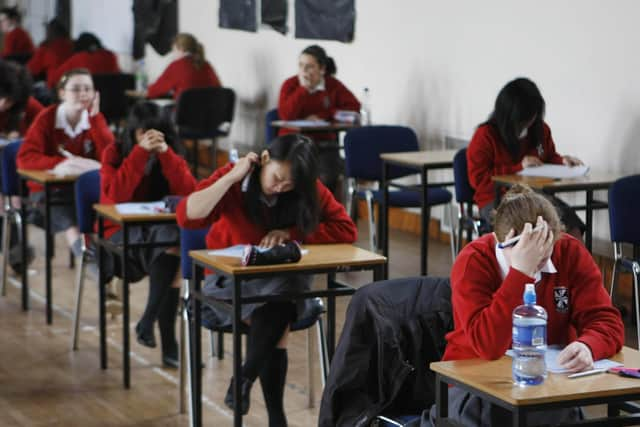GCSE and A-level results; the key lessons here in Yorkshire – Jayne Dowle
The greatest challenge, however, is what happens next. I said this to my 18-year-old niece, who has achieved a distinction in her extended diploma in art and design. Put off by the pandemic, she is not keen on seeking a university place this year, or possibly ever.
She would prefer an apprenticeship, but hunting one down is proving difficult. For now, she will continue her part-time job in a garden centre and hope that an opportunity somehow presents itself.
Advertisement
Hide AdAdvertisement
Hide AdEducation, as Mr Williamson struggles to grasp, is not necessarily a means to an end but a continuous journey. There aren’t nearly enough clear signposts along the way.


For millions of young people, the first step towards the future will come today when they receive their GCSE results.
We’re watching and waiting, as we have a number of friends and their children on tenterhooks this morning. Also, my daughter, Lizzie, takes her own GCSEs next year. I can’t say I’m looking forward to the real thing.
Although school life has settled down into more familiar patterns of late, the over-riding atmosphere is still of uncertainty. If Covid strikes with ferocity again, the prospect of disrupted classroom time and home-learning hangs over us.
Advertisement
Hide AdAdvertisement
Hide AdAgainst this already unsettled background, it’s doubly important that Mr Williamson, as Education Secretary, shows a clear way forward.


Yet the stark differences in experience between state and independently-educated teenagers have been laid bare already this week, with the furore over A-level grades.
Although the proportion of students receiving A or A* grades has increased across the board, independent schools have done disproportionately well, with 70 per cent of entries from their pupils awarded at least an A, with 40 per cent getting an A*.
I have no axe to grind against independent education – friends and relations send their children to the full range of schools, from comprehensives, academies and selective grammars to independent day and boarding establishments. I’ve long defended the right of families to choose what is right for their own children.
Advertisement
Hide AdAdvertisement
Hide AdHowever, Mr Williamson stands guilty of several major failings; turning a blind eye as independent schools have stolen a march on academic achievement, lacking empathy for the huge pressures staff in state-funded schools have been under during the pandemic, and falling short of the mark when it comes to clear delineation of choices post-16.


We can’t, in general, do much about the fact that families with the financial wherewithal are at liberty to pay for education. The alternative, as voted for at the 2019 Labour party conference, is to abolish independent schools.
And we can’t, despite his plaintive open letter to the profession, expect much more in terms of support for teachers from an Education Secretary not blessed with the negotiation skills required to handle the teaching unions.
These are, effectively, matters which fall into the ‘personal’ and ‘personnel’ categories. However, we can justifiably argue that the decisions which immediately follow GCSEs set in stone choices which determine the course of young adult lives, and also, contribute to the future of the economy and the UK’s standing in the world.
Advertisement
Hide AdAdvertisement
Hide AdIt is tragic then that successive Education Secretaries have failed to get to grips with these crucial two years. The much-discussed overhaul of the A-level system is still to happen. The Augur Review of post-18 Education and Funding, commissioned by former premier Theresa May in 2018, has only so far received an interim response.
Critics of A-levels argue that 16-year-olds specialise too early and a broader qualification along the lines of the International Baccalaureate would be more beneficial.
More importantly, there is still far too much prejudice, yes snobbery, about vocational courses such as T-levels and extended diplomas in ‘hands-on’ fields including agriculture, construction, art and design, science, accounting and education, as an alternative to the academic route of A-levels.
Tackling this lack of understanding about apprenticeships, at post-16, post-18 and degree level, should be the priority of any Education Secretary.
Advertisement
Hide AdAdvertisement
Hide AdAnd there is also the abject failure to get to grips with bringing all post-16 young people up to the basic standards of five GCSES at Grade 4 or above, including Maths and English. One major challenge Mr Williamson failed to mention in his letter is finding places for GCSE resits in already over-burdened further education colleges – yet another reminder that the path at post-16 is by no means clear.
Support The Yorkshire Post and become a subscriber today. Your subscription will help us to continue to bring quality news to the people of Yorkshire. In return, you’ll see fewer ads on site, get free access to our app and receive exclusive members-only offers. Click here to subscribe.
Comment Guidelines
National World encourages reader discussion on our stories. User feedback, insights and back-and-forth exchanges add a rich layer of context to reporting. Please review our Community Guidelines before commenting.